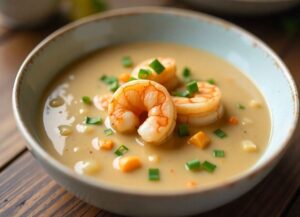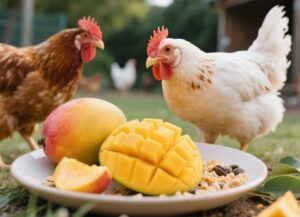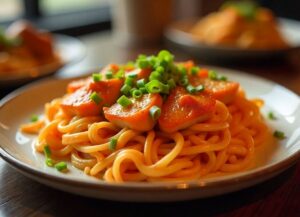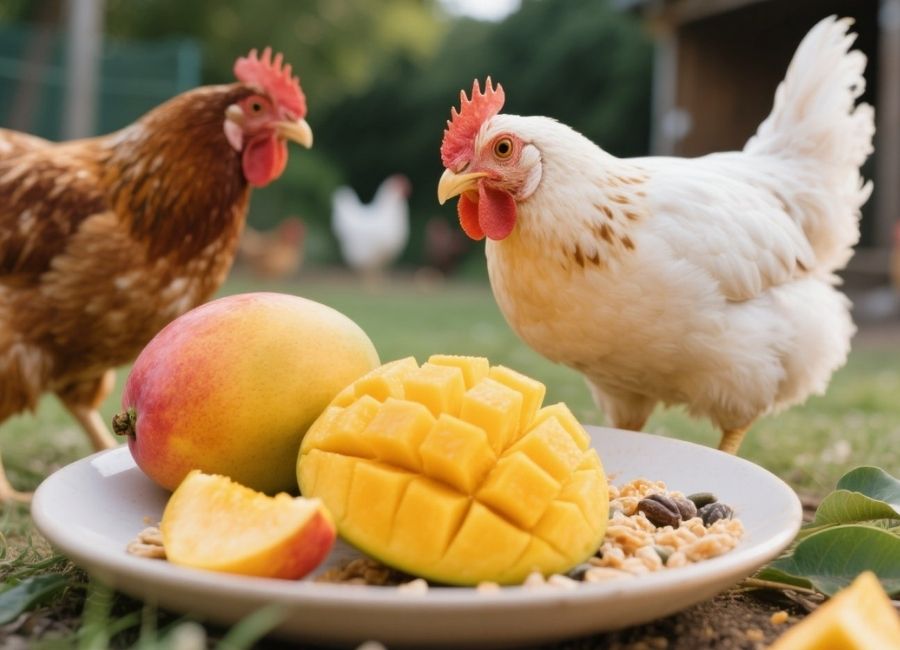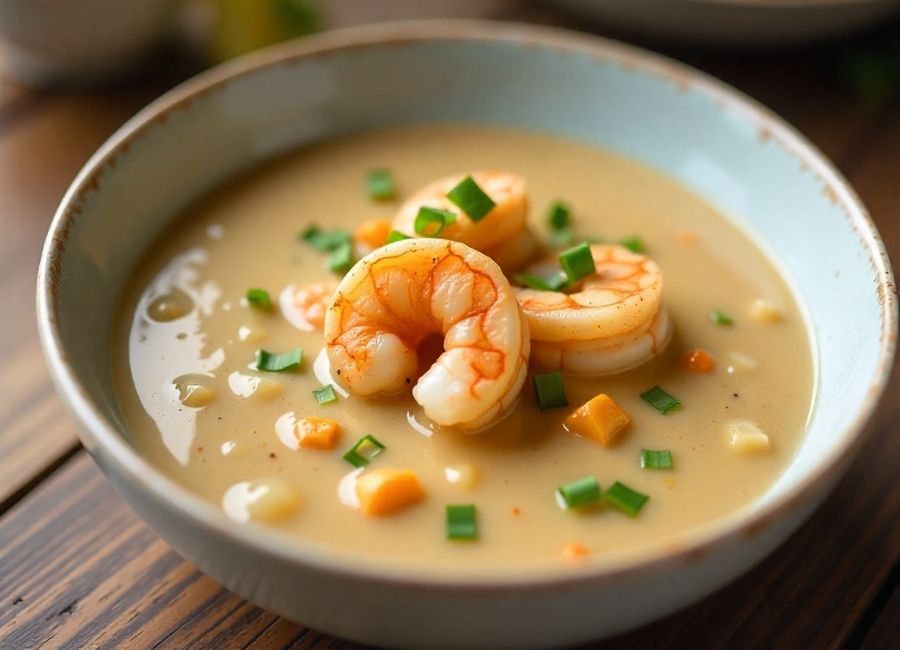If you’re a backyard chicken keeper, you’ve probably wondered about including different treats in your flock’s diet. One fruit that often raises curiosity is mango. Can chickens eat mango safely? How does it affect their health? And what are the benefits or potential risks of feeding mango to your feathered friends?
This guide will cover everything you need to know about offering mango to your chickens. By the end, you’ll have a clear understanding of whether mango can be part of your chickens’ diet and the best practices for serving it.
Can Chickens Eat Mango Safely
Yes, chickens can eat mango safely in moderation. Mango is a naturally sweet treat that contains essential vitamins and minerals beneficial to poultry. However, understanding the parts of the mango that are safe, how to prepare it, and how often it can be given is crucial.
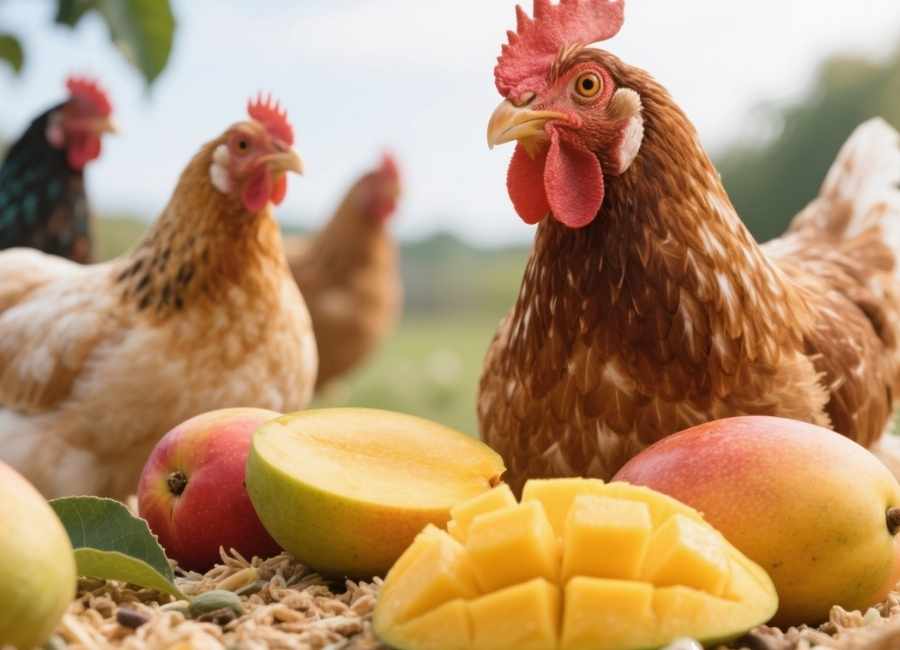
Nutritional Benefits of Mango for Chickens
Mangos are a nutrient powerhouse for chickens, offering a range of vitamins and minerals to boost their health. Here’s a breakdown of why adding mango to their diet occasionally can be a great idea:
- Vitamin A: Mango is rich in Vitamin A, which is vital for chickens’ eyesight, feather health, and overall development.
- Vitamin C: Although not an essential nutrient for chickens, Vitamin C can give their immune systems a boost during stressful times like molting or extreme temperatures.
- Fiber: The fiber content in mango aids in digestion, helping your flock maintain a healthy digestive system.
- Natural Sugars: The natural sweetness of mango provides chickens with a little energy boost, though it should be offered sparingly to avoid overconsumption.
Which Parts of the Mango Can Chickens Eat
Chickens can eat certain parts of the mango, but not all are safe. Here’s a quick rundown of what to include and avoid:
- Mango Flesh: The juicy, orange flesh of the mango is perfectly safe for chickens to eat. Make sure to remove the peel and seed before offering it to them.
- Mango Peel: While some chickens may nibble on the peel, it can be tough and harder to digest. It is better to remove it to ensure safety.
- Mango Seed: Never give your chickens mango seeds. The seed is not digestible, and its hard surface can pose a choking hazard.
Potential Risks of Feeding Mango
While mango has its benefits, there are a few precautions to keep in mind before incorporating it into your chickens’ diet.
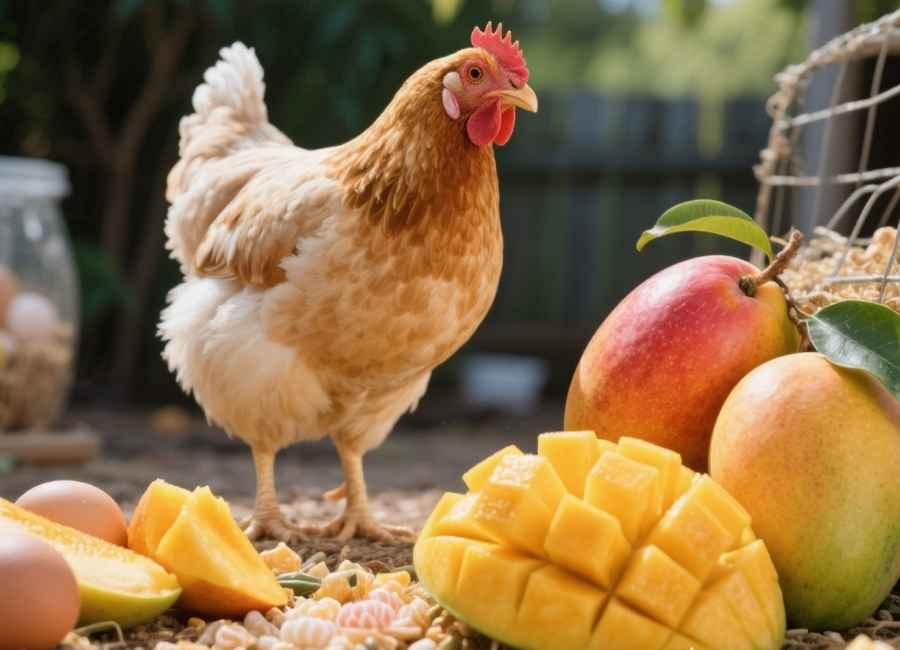
Moderation is Key
Mango is high in natural sugars, which can be harmful if overfed. Excessive sugar intake may lead to obesity, digestive issues, or a drop in egg production.
Allergic Reactions
Some chickens may show sensitivity to mango due to its trace levels of urushiol, a compound also found in poison ivy. Observing your flock after their first encounter with mango is crucial. If you notice discomfort, avoid offering mango in the future.
Moldy or Overripe Mango
Never feed your chickens moldy or overripe mango. Mold can produce mycotoxins harmful to their health, and overripe fruit can lead to fermentation in their digestive system.
How to Safely Serve Mango to Chickens
Follow these steps when preparing mango for your birds to ensure their safety and enjoyment:
Step 1 Select a Fresh Mango
Choose a ripe, firm mango without signs of mold or bruising. Ensure it’s fresh and safe for consumption.
Step 2 Wash and Peel
Wash the mango thoroughly to remove any pesticides or dirt from the surface. Peel the mango to avoid potentially tough and indigestible skin.
Step 3 Remove the Seed
Cut the mango flesh into bite-sized pieces, separating it from the seed. This eliminates any choking hazards.
Step 4 Offer Mango in Moderation
Place the mango chunks in their feeding area and monitor how much they eat. Offering mango as an occasional treat (once or twice a week) is best, so it doesn’t replace their staple diet.
Step 5 Clean Up Leftovers
Remove any uneaten mango after feeding. This helps prevent attracting pests or bacteria growth in your chicken coop.
Other Fruits Chickens Can Eat
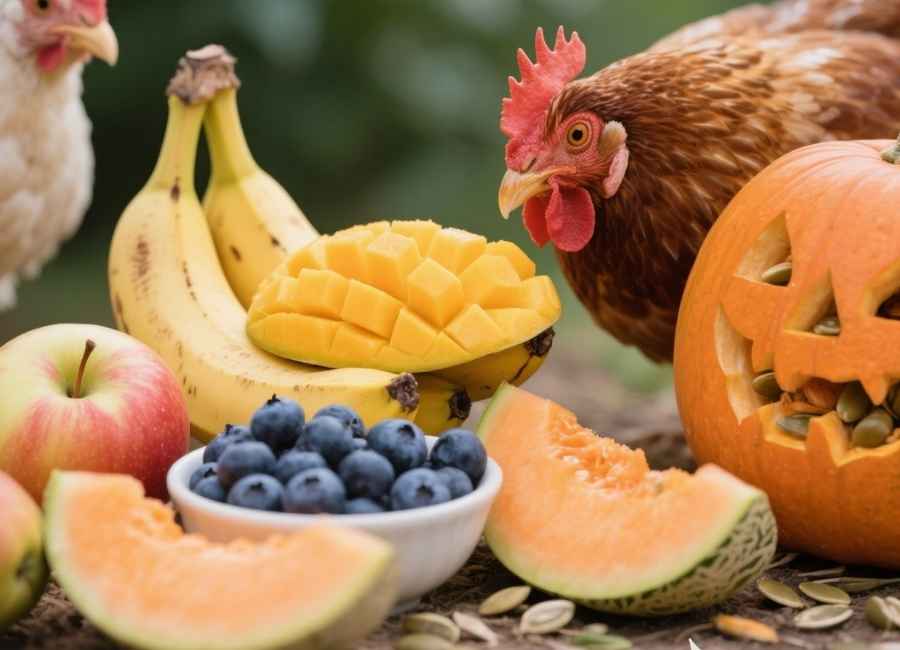
If your chickens love mango, they might enjoy other fruits too. Some safe options include:
- Bananas (rich in potassium and easy to mash)
- Apples (remove seeds, as they contain trace levels of cyanide)
- Blueberries (an antioxidant-rich treat)
- Melons (watermelon and cantaloupe are hydrating favorites)
- Pumpkin (including seeds, which are a natural dewormer)
Always introduce new fruits gradually and observe your flock for any adverse reactions.
Fruits to Avoid
While many fruits are chicken-friendly, some are not safe:
- Avocado (contains persin, which is toxic to chickens)
- Citrus Fruits (can upset their stomachs and interfere with calcium absorption)
- Rhubarb (leaves are highly toxic to poultry)
- Grapes and Raisins (may cause kidney damage in large amounts)
Build a Balanced Diet for Healthy Chickens
While treats like mango can be a delightful addition to your chickens’ diet, their primary nutrition should come from high-quality feed. Ensure their feed is well-balanced with essential macronutrients, vitamins, and minerals to support egg production and overall health.
Treats like mango should make up no more than 10% of your flock’s overall diet. Keeping their diet balanced is the best way to maintain their health, energy, and productivity.
Final Thoughts on Feeding Mango to Chickens
Mango can be a wonderful, occasional treat for your backyard flock. Its nutritious benefits, such as Vitamin A and fiber, support their overall health, but remember to serve it in moderation and always remove the peel and seed.
A happy, healthy flock thrives on variety, so feel free to explore other safe fruits alongside mango to keep their diet balanced and exciting. If you’re unsure about adding new treats to your chickens’ menu, consult your local veterinarian or poultry expert for tailored advice.
Happy feeding!
